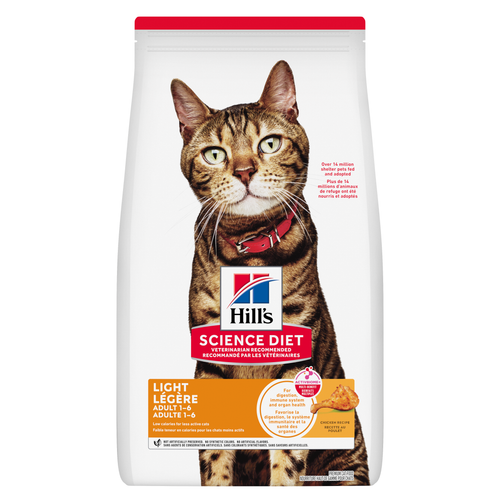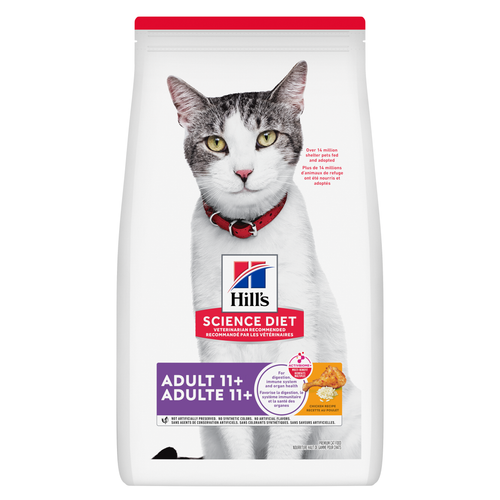
-
Find the right food for your petTake this quiz to see which food may be the best for your furry friend.Find the right food for your petTake this quiz to see which food may be the best for your furry friend.Featured products
 Adult Healthy Mobility Small Bites Chicken Meal, Barley & Brown Rice Recipe Dog Food
Adult Healthy Mobility Small Bites Chicken Meal, Barley & Brown Rice Recipe Dog FoodAdvanced nutrition to support hip & joint health from day 1
Shop Now Adult Light Large Breed Chicken Meal & Barley Recipe Dog Food
Adult Light Large Breed Chicken Meal & Barley Recipe Dog Food18% lower calories vs. Science Diet Large Breed Adult
Shop Now Adult Sensitive Stomach & Skin Small & Mini Chicken Recipe Dog Food
Adult Sensitive Stomach & Skin Small & Mini Chicken Recipe Dog FoodHill's Science Diet Sensitive Stomach & Skin Small & Mini dry dog food is tailored nutrition for Small & Mini dogs while being gentle on stomachs. Nourishes skin & promotes a lustrous coat.
Shop NowFeatured products Adult Light Chicken Recipe Cat Food
Adult Light Chicken Recipe Cat Food20% lower calories vs. Hill's Science Diet Adult
Shop Now Adult 11+ Chicken Recipe Cat Food
Adult 11+ Chicken Recipe Cat FoodSupports brain health & beautiful fur. Helps keep immune system, heart & kidneys healthy.
Shop Now Adult Healthy Cuisine Seared Tuna & Carrot Medley Cat Food
Adult Healthy Cuisine Seared Tuna & Carrot Medley Cat FoodDelicious seared tuna paired with tender carrots in a mouthwatering sauce
Shop Now -
Dog
- Dog Tips & Articles
-
Health Category
- Weight
- Food & Environmental Sensitivities
- Urinary
- Digestive
- Joint
- Kidney
- Dental
- Cancer
-
Life Stage
- Puppy Nutrition
- Adult Nutrition
- Senior Nutrition
Cat- Cat Tips & Articles
-
Health Category
- Weight
- Skin & Food Sensitivities
- Urinary
- Digestive
- Kidney
- Dental
- Stress
- Cancer
-
Life Stage
- Kitten Nutrition
- Adult Nutrition
Featured articles Water
WaterDiscover why water is the most important nutrient for your dog or cat to live a healthy life. Find out how much water your pet should consume each day.
Read More Antioxidants
AntioxidantsUnderstand the importance of antioxidants in your dog or cat's food, and how they can help protect your pet and keep them healthy.
Read More Importance of DHA in your Pet's Food
Importance of DHA in your Pet's FoodLearn about DHA, Docosahexaenoic Acid, a natural omega-3 fatty acid that is essential in the development of the brain and nervous system in cats & dogs.
Read More -


Stomatitis in cats, also known as feline stomatitis or feline chronic gingivostomatitis, refers to inflammation in a cat's mouth. This disease is common, painful and affects cats of all breeds and ages. While it can be fatal, the right treatment can help your cat live comfortably with this condition.
What Is Feline Stomatitis?
Stomatitis in cats is a blanket term for extensive, chronic and painful inflammation in the mouth. According to the Massachusetts Society for the Prevention of Cruelty to Animals, up to 4% of cats are affected by the disease. There are two main types of stomatitis. One form involves inflammation of the gums surrounding teeth; the second form, called caudal stomatitis or faucitis, affects the back of the mouth where the upper and lower jaws meet.
What Causes Stomatitis in Cats?
Researchers haven't yet discovered the cause of stomatitis in cats. They know that affected cats have altered immune function, but it's not clear why. Viruses, bacteria and periodontal disease are all thought to contribute to the disease, but scientists don't know what makes affected cats' immune systems go haywire in response to plaque and bacteria.
Some studies suggest a link between stomatitis and calicivirus, a virus that causes upper respiratory disease in cats. Viruses that affect the immune system, like feline leukemia virus and feline immunodeficiency virus, may also play a role. All that scientists know for sure is that affected cats develop a disproportionate reaction to plaque and bacteria that leads to excessive inflammation in the mouth.


Tasty Tips
We believe that science is the best path to giving your pet the best care possible.

Stomatitis in cats refers to inflammation in a cat's mouth.
What Are the Signs of Stomatitis in Cats?
Signs of stomatitis are associated with inflammation — think really red gums. The affected areas in a cat's mouth are typically bright red and bleed easily. Feline stomatitis also causes bad breath, drooling and excessive swallowing. Because stomatitis is often painful, affected cats may refuse to eat and groom, or they may chatter their teeth or paw at their faces. Cats with stomatitis may be thin, look scruffy, have matted hair and be underweight.
How Is Stomatitis in Cats Diagnosed?
There's no specific test for feline stomatitis. The diagnosis of stomatitis in cats is based on a cat's health history and a physical examination. Your veterinarian may recommend additional tests, such as tests for feline leukemia virus and feline immunodeficiency virus, routine bloodwork and a urinalysis. These tests can rule out other conditions that cause inflammation in the mouth, including tooth resorptive lesions, liver disease, kidney disease and cancer. Dental X-rays and a complete oral examination are also usually recommended. Depending on what your veterinarian finds during the oral exam, they may suggest a biopsy.
How Is Stomatitis in Cats Treated?
Treatment of feline stomatitis depends on many factors, including the severity of the disease and a cat's response to therapy. Because no one knows what actually causes feline stomatitis, there's no specific treatment. However, there are many ways to help manage the disease.
If your cat has been diagnosed with feline stomatitis, getting them regular veterinary and dental care gives them the best chance at successfully managing the disease. Because stomatitis is so painful, the first step of treatment is to control pain with medication. If your cat has an oral infection, your veterinarian may also prescribe antibiotics. Because periodontal disease is associated with stomatitis, your veterinarian will likely recommend your cat has routine dental care, including dental X-rays and a thorough cleaning, which is a good idea even for cats that aren't currently experiencing oral health issues.
When the disease is properly managed, cats' long-term outcomes vary. Even with dental care, many cats with stomatitis require long-term anti-inflammatory medicine and occasional antibiotic therapy to control inflammation.
If your cat doesn't respond well to medical management, your veterinarian will likely recommend extracting their teeth. Teeth provide a surface for bacteria, which causes the immune system to overreact; removing teeth eliminates the opportunity for bacterial colonization. Cats who get teeth extracted usually just have their molars and premolars removed. Overall, cats tend to do very well after this procedure and once healed, tend to eat better. In fact, some cats can even eat dry food without teeth.
What Is the Role of Nutrition in Managing Stomatitis in Cats?
Cats who have feline stomatitis may find it too painful to eat hard food. If your cat is suffering from stomatitis, your veteranarian can recommend ways to try to make eating more comfortable, such as switching to a soft canned food or moistening your cat's dry food with water, so it forms a mash. Some cats may even find it difficult to eat canned food; in this case, you may have to puree canned food until their gums heal.
Even though feline stomatitis is a painful condition, many cats respond well to veterinary therapy and are able to regain a wonderful quality of life.


Dr. Sarah Wooten graduated from UC Davis School of Veterinary Medicine in 2002. A member of the American Society of Veterinary Journalists, Dr. Wooten divides her professional time between small animal practice in Greeley, Colorado, public speaking on associate issues, leadership, and client communication, and writing. She enjoys camping with her family, skiing, SCUBA, and participating in triathlons.

See what Vets have to say
Read reviews from the experts and see why Hill's is the #1 Veterinarian Recommended brand.
See what Vets have to say
Read reviews from the experts and see why Hill's is the #1 Veterinarian Recommended brand.



